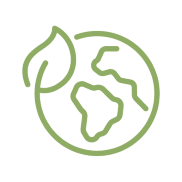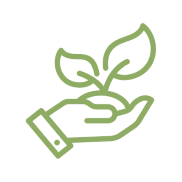Strategy & guidelines
Different, because:
we see a clear path toward a more sustainable future.
Contents strategy
Thinking and acting sustainably have always been integral elements of Oberbank’s value-based strategy. As an independent regional bank, we are deeply rooted in our markets and support local communities and businesses.
Our values form the central basis for our strategy. This has allowed us to maintain our independence for more than 150 years. Because this is the only way to ensure that Oberbank, in its actions, can strike a balance between the interests of customers, employees and shareholders – now and in the future. All other strategic goals pursued by Oberbank are aligned with this principle. It serves as the foundation for our unusually successful development in now five countries – Austria, Germany, the Czech Republic, Slovakia and Hungary.
A modern sustainability strategy with clear goals and successful sustainability management are of great importance for the further development and future success of Oberbank. The sustainability strategy is therefore a fixed component of Oberbank’s overall banking strategy.
Guidelines
Oberbank not only follows existing guidelines, but also sets its own high standards for compliance with ethical principles. These are set out, among other things, in our Code of Conduct for all employees. Exclusion and positive criteria for our financing operations are also a key aspect.
As a listed company, Oberbank AG is committed to the ÖCGK as amended from time to time.
The Code of Conduct applies to all Oberbank employees. Oberbank is expressly committed to always acting in a responsible, ethical and appreciative manner, both internally and externally. This generally relates to dealing with people, be it employees, customers or stakeholders. But it also means taking into account ecological and economic aspects and finally dealing responsibly with all legal framework conditions. Ethical principles are the foundation of each and every decision and action.
To the Code of Conduct for employees
In addition to the general Code of Conduct for employees, Oberbank also has a Code of Conduct for suppliers and business partners, which extends the rules and measures mentioned in the Code of Conduct to the collaboration with external partners. All suppliers of Oberbank AG must comply with these principles, which include compliance with the law, respect for human rights, various environmental regulations and the prohibition of corruption and bribery.
To the Code of Conduct for suppliers and business partners
Oberbank distances itself from industries, companies and business practices that, in its view, could result in unacceptable impacts on the environment, social aspects and governance (ESG).
Financing and account business
The following exclusion criteria based on sustainability aspects are mandatory for new customer business as well as for new fields of business that existing customers may enter into, and they are not subject to any option for approval.
Asset management
In the asset management, the following exclusion criteria do not apply, but rather special Minimum Standards tailored specifically to asset management.
Any products that do not fulfil the Minimum Standards are excluded. For sectors that entail higher sustainability risks – coal, controversial and conventional weapons, tobacco, adult entertainment and raw materials – the Minimum Standards define limits that must be complied with (e.g. no direct investment in companies whose share of revenue from coal mining exceeds 5%).
The Minimum Standards must be observed for discretionary asset management and active product recommendations from the product governance advisory universe. Therefore, only those securities that meet Oberbank's Minimum Standards are available to customers advisors.
Non-trading portfolio
In case of new investments by Oberbank, the following exclusion criteria must be fully observed. Compliance with the exclusion criteria in the area of own investments is also laid down in Oberbank's investment policy.
Example of government bonds: Oberbank does not purchase government bonds from countries that have not ratified the Paris Climate Agreement. If a country withdraws from the Paris Climate Agreement, Oberbank does not acquire any new government bonds from this country as of this date; however, bonds acquired before the withdrawal are still held.
Private individuals
Private individuals are not covered by the exclusion criteria, but some transactions by private and corporate customers – for example in the betting and gambling, adult entertainment and weapons sectors – require approval from the Management Board under money laundering law, unless their transactions are already excluded due to the exclusion criteria. In the Know Your Customer (KYC) process, private customers are therefore also subject to numerous checks.
1. General exclusion criteria
Oberbank does not enter into business relationship and/or will distance itself from companies if labour law and human rights violations (including the employment of children), illegal business practices or controversial environmental behaviour are known or become known in the course of the business relationship.
|
Criterion |
Example |
|
Labour law violations |
when at least one of the five fundamental principles of the ILO - Declaration on Fundamental Principles and Rights at Work is violated:
e.g. if working conditions, especially with regard to minimum wages, working hours, safety and health are unreasonably poor, forced labour is practised, or minimum standards are systematically bypassed. |
|
Human rights violations |
when human rights are violated in the meaning of nationally and internationally recognised legal bases (e.g. European Convention on Human Rights and Fundamental Freedoms, Charter of Fundamental Rights of the European Union, UN Global Compact, OECD Guidelines for Multinational Enterprises, etc.).
These include, among others,
|
|
Illegal business practices |
Products or activities that are considered illegal under applicable laws, other provisions of the respective national legal system or international conventions and agreements (e.g. money laundering, fraud, corruption and bribery, financing of terrorism, etc.). |
|
Controversial environmental behaviour |
Controversial environmental practices that violate applicable national or international environmental laws and agreements (e.g. Bern Convention*, Ramsar Convention**, Convention on Biological Diversity***) and are incompatible with general sustainable values and the preservation and promotion of biodiversity. This includes, for example, systematic behaviour leading to contamination or pollution, projects such as the construction or operation of large dams with a major negative impact on the environment and biodiversity, or encroachment in ecosystems and protected areas (e.g. Natura 2000 protected areas**** and other protected areas in the Oberbank markets*****). |
|
Unethical behavior |
when companies come to light due to extreme political views (e.g. right-wing extremism or populism, National Socialist ideology, terrorism) or if there are suspicions, serious allegations or justified concerns in this regard (e.g. media coverage, reports form supervisory and regulatory authorities, public databases and registers) or if there is a legally binding conviction (e.g. under the Prohibition Act or terrorism offenses of the Criminal Code) |
* Convention on the Conservation of European Wildlife and Natural Habitats
** Convention on Wetlands of International Importance
*** Convention on Biological Diversity
**** For the Natura 2000 areas in the Oberbank markets, see the links for Austria, Germany, the Czech Republic, Slovakia and Hungary.
***** According to Verein Österreich, Austria's protected areas include six national parks, 48 nature parks, one UNESCO biosphere park and one UNESCO World Heritage region. According to the German Federal Agency for Nature Conservation, there are 8,902 nature reserves in Germany, including the Pomeranian Bay, the Ammer Mountains, the Lower Oder Valley National Park and the Lüneburg Heath. In the Czech Republic, there are five national parks (including Šumava and Krkonoše) as well as numerous nature reserves; see the information provided by the Czech Tourist Board. According to the Slovakian National Tourist Board, there are nine national parks (including Tatra, Pieniny, Small and Great Gatra) as well as numerous protected mountains, gorges and bodies of water. According to the Hungarian Ministry of Agriculture, Hungary's nature reserves include the Balaton Highlands National Park, the Danube-Ipoly National Park and the Aggtelek National Park.
2. Sector-specific exclusion criteria
Oberbank considers the following economic activities and industries to have an increased ESG risk potential and excludes them.
|
Industry / Criterion |
Exclusion of |
|
Nuclear energy |
|
|
Illegal substances (narcotics) |
|
|
Harmful substances |
|
|
Gems and conflict minerals |
|
|
Fishing |
|
|
Trade in protected animals or export leather, as well as animal testing |
|
|
High volume fracking and extraction of oil sands
Crude oil |
|
|
Coal |
|
|
Controversial and heavy weapons |
|
|
Embryo research |
|
|
Pornography industry and comparable industries (“red light district”; adult entertainment) |
|
|
Mining |
|
|
Betting and gambling |
|
****** e.g. tin, tantalum, tungsten or gold, which are mined in the Democratic Republic of Congo and its neighbouring states, among others. This region is heavily affected by armed conflict, with the warring parties often financing themselves through the control of mines
******* Definition according to the Kimberley Agreement: smuggled diamonds that have financed or are financing various wars in Africa.
******** The Arcitc Monitoring & Assessment Programme (AMAP) defines its scope and thus the geographical region of the Arctic as follows: "High Arctic, extending to the sub-Arctic areas of Canada, the Kingdom of Denmark (Greenland and the Faroe Islands), Finland, Iceland, Norway, the Russian Federation, Sweden and the United States, including associated marine areas".
********* An exception in the sense of a possibility of authorisation exists only for the area of heavy weapons. An exceptional permit for the financing of heavy weapons may be granted by the responsible risk director on the Management Board if justifiable, documented and overriding national/supranational interests prevail.
3. Exclusion criteria for countries
In keeping with the principle of regionalism, Oberbank focuses on companies in those countries in which it is active or which have their registered office in the EU or belong to a UNIDO member state. In addition, we do not engage in proprietary transactions with central governments, which are excluded by the following criteria:
|
Criterion |
The following are excluded |
|
FATF list
EU liste of high-risk countries |
Countries on the black, dark grey or grey list of the Financial Action Task Force on Money Laundering (FATF)
Countries on the EU list of high-risk countries set out in the Regulation (EU) 2020/855
|
|
Climate protection |
Countries that have not ratified the 2015 Paris Climate Agreement (Ratification of the Paris Climate Agreement) |
|
Freedom of the press and media |
Countries with a “very serious situation” or “difficult situation” according to the “Reporters Without Borders” press freedom ranking |
|
Sanctions |
Countries subject to UN-, US- or EU-sanctions, unless Oberbank has specially defined policies and procedures in place to migrate the risks in question to an appropriate extent and in legally compliant manner |
4. Dealing with corporate groups
Within a group, those companies whose business activities violate the above exclusion criteria are excluded or not financed. The other companies in the group remain eligible for financing.
In order to contribute to the sustainable develoment of our environment and our society the Oberbank Sustainable Corporate Lending Framework was developed as a new basis for analysing lending operations in terms of their environmental sustainability. The Framework will be further developed and adapted.
Latest version:
Oberbank Sustainable Corporate Lending Framework (English)
First version Sustainable Corporate Lending Framework 2023 including SPO
Oberbank Sustainable Lending Framework 2025 (Englisch)
Sustainable Corporate Lending Framework 2023 (English)
Oberbank Sustainable Lending Framework 2024 (Englisch)
Second Party Opinion ISS ESG Sustainable Corporate Lending Framework 2023
Sustainable Accounts: Impact & Allocation Reporting
Appendix Green Bond Framework 2021
Second Party Opinion ISS Green Bond Framework 2021
Oberbank clearly commits to the 1.5°C goal of the Paris Climate Agreement and aligns its climate strategy with the decarbonisation of its loan portfolio. For the three central asset classes of Commercial Real Estate, Residential Mortgages, and Business Loans, concrete, measurable targets up to 2030 and 2050 have been defined to achieve a net-zero portfolio by 2050.
Strategic sustainability goals for 2025

In governance
- We are committed to the Paris Climate Agreement’s 1.5 degree goal.
- We pursue a clear sustainability strategy. It is part of our overall banking strategy.
- We actively participate in ESG initiatives and establish new partnerships, thereby reaffirming our high compliance standards regarding ethical principles.
- We cultivate a regular exchange with our stakeholders.

In finance and in lending policy
- By 2025, we will have provided sustainable private financing (energy-efficient housing) in the amount of at least 1.5 billion euros. This corresponds to more than 50 percent of newly granted housing loans.
- We identify and assess ESG risks in our loan portfolio and implement appropriate decarbonisation measures through the application of limits, exclusion and positive criteria, etc.
- Impact reporting: We measure and report annually on the impact (CO2 reduction) achieved through our sustainable financing.
- By 2025, more than 50 percent of all new Oberbank issues will comply with ESG criteria.

In asset management
- We are increasing the volume of the sustainable 3BG mutual funds to more than EUR 1 billion by 2025.

For society
- We are committed to the principle of regionalism: 95 percent of our sponsorship and donation budget goes to projects in our markets. In procurement, we work primarily with partners from our regions.

For the environment
- We will be climate neutral (in Scope 1 & Scope 2) by 2025 and contribute to limiting the temperature increase to 1.5 degrees.
- The carbon footprint per employee will be less than 1 tonne by 2025.

For our customers
- We have an excellent customer experience management: high customer satisfaction rate of more than 60 points (NPS).
- We support our clients in the digital transformation of banking services. The degree of digitalisation is greater than 80 percent.

For our employees
- Next generation: We offer young potentials the opportunity to advance their development. We fill 80 percent of management positions from our own ranks.
- Gender balance: 30 percent female executives in 2025, 40 percent female executives in 2030.
Environmental & climate protection
We incorporate ecological and social aspects into all our considerations.
Employees
We are heading towards a more sustainable future together with our employees.
Society
Oberbank can only be economically successful if it also assumes its social responsibility.
Ratings & memberships
Oberbank makes a measurable contribution to sustainable development.